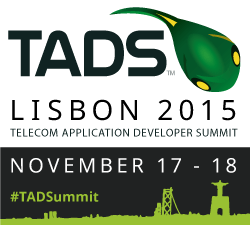TADSummit is bigger, better and more intense than ever, its special:
- 15 sponsors: WSO2.Telco, Ubuntu, Truphone, Tropo, Telestax, Oracle, Nexmo, Metaswitch, Matrix, Huawei, hSenid Mobile, Genband, Ericsson, Dialogic, and APIdaze.
- 22 partners: Thanks to CMTelecom, Opencell, Zoiper; and existing partners Tyntec, VUC, webrtcH4CKS, and Disruptive Analysis for all their help and support.
- 7 events happening around TADSummit: Cloud Communications Alliance Europe, Libon Workshop, API Benchmarking workshop, Communications Developers Workshop, RESTComm for Newbies Workshop, Huawei GSIC Workshop, and RESTConn.
- Over 50 original presentations, no tired old vendor marketing pitches, cutting edge stuff the weaker conferences copy in 2016.
- TADS is live streamed and every presentation is recorded and available on the TADSummit YouTube channel for off-line viewing. Last year’s presentations received 7000 views and 35,000 minutes of viewing time. The audience is global.
- And 1 event dinner thanks to Tropo / Cisco, we only have 100 seats for dinner, today (5th Nov) is your last day to confirm for the dinner at Café Luso, check out the agenda for details.
The Telecom Application Developer Summit (TADS) is a grass roots initiative to build an open ecosystem focused on helping businesses use telecom capabilities in their applications, services and business processes.
We bring together the leaders in the industry – across service providers, technology providers, developers, and enterprises – to work on getting new services to market and making business success in new services an everyday reality. By leaders we mean those affecting change, not only those with a Chief or VP in their title.
This makes it unique, in a sea of Digital Tripe TADS focuses on the people, services, business and technologies driving telecom app development.
We’re not afraid of bucking the group-think created by weak-minded marketing. For example, Digital Transformation is utter nonsense. Digital was cool in the ’70s, just like when telecom services became digital with digital exchanges, ISDN and later video and internet services. The internet has been digital since it was created in 1969. And transformation is yet another nonsense word for pretending to change. Change comes from outside an organization, not inside.
TADS is an open ecosystem, check out the packed agenda to see an amazing line up of leading edge services and technologies: RogerVoice, Zenly, Fone.do, Pinig, MashMeTV, KISST.me, SaferMobility, EMnify, Aeris, Truly Wireless, TalkDesk, Artisan, and LyteSpark. Never mind all the innovators attending not presenting. The list goes on, but the point is clear, TADSummit is the place to promote your services for global attention, build partnerships, get those services into even more customers’ hands, and to witness the revolution happening in telecom app development.
Two critical trends have created this category of telecom app development. The internet and web have democratized telecoms, so anyone can do it. Telecom app development is not beholden to telcos nor to the BABS (Bay Area BS) machine, it can happen anywhere – its local. Telecoms is now programmable (APIs and platforms), its easy to integrate into you applications, services and business processes.
Telecom is so much more than poles, holes, towers and cables. Here is a definition. Telecoms: transmission of information, as words, sounds, or images, usually over great distances, in the form of electromagnetic signals, as by telegraph, telephone, radio, television, and the internet.
Whether its person to person or application to person. Telecoms will remain an essential part of our lives, and its becoming ever richer thanks to a growing telecom app development ecosystem.



Alan,
Your agenda brochure dated Nov 5 has the Istanbul header logo on pages 2-11.
Cheers and good luck with summit,
Michael
PS where’s the panel on price signals and incentives between actors and layers (aka settlements)?
Thx Michael, oops, on it.
We avoid the settlements issues as they are very boring and the discussions go nowhere. Its all IP, use telephony services where it makes economic sense, else there are lots of choices for telecoms thanks to the internet, web and APIs to regulated services like SMS/telephony, but also WebRTC, and platforms like Viber, etc.